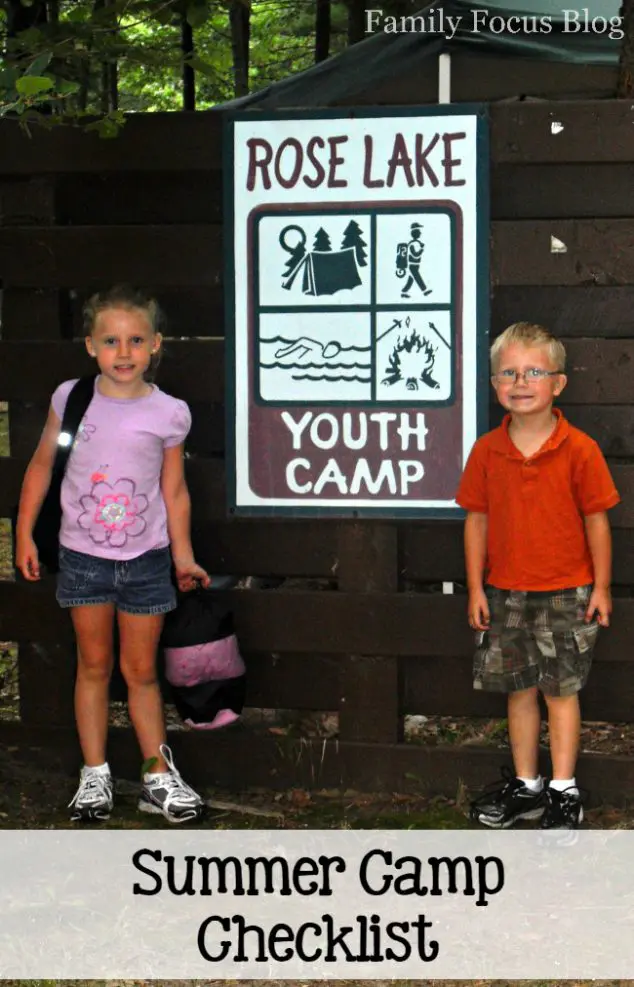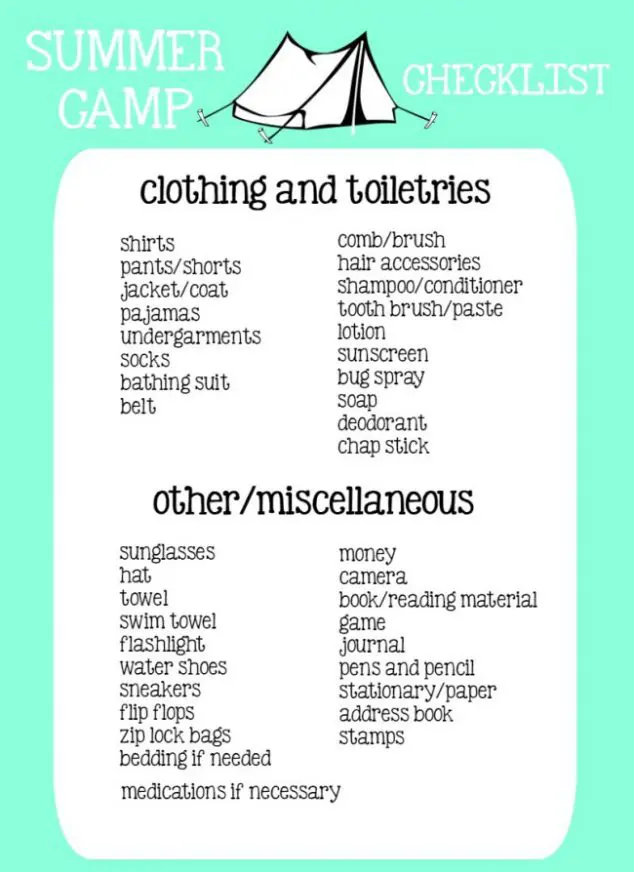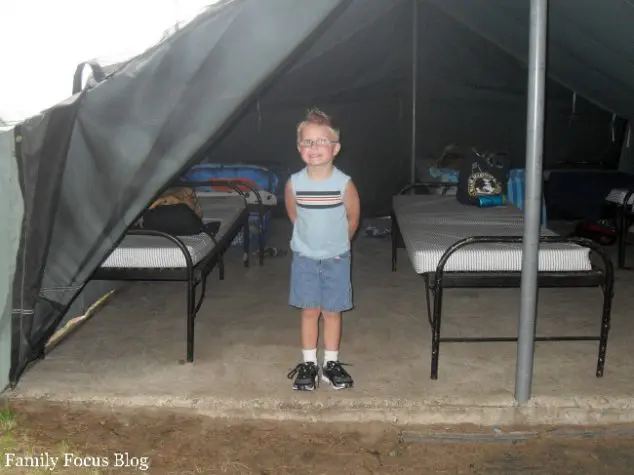Summer is almost here and for us there are just two short weeks until school is out. Some of my favorite memories of my summers as a youth were being a camp counselor for an overnight camp in our community. Now my children and nieces and nephews make fond memories at that same summer camp! When your child is getting ready to go away to summer camp there are so many things to remember and think of whether it is their first time or their 15th. I’ve made a Summer Camp Checklist printable to help you make sure you’ve remembered the basics. This summer camp packing list will have them fully prepared with every from bug spray to a journal to record their experience.
This popular post was originally published May 26, 2015. I have republished it here to add a summer camp packing list pdf and make it easier for my new readers to find.
There are all types of summer camps available from STEM learning camps, to sports camps, to band camp! There are also half day camps, day camps, and overnight summer camps. Kids can learn so much through summer camp activities. It is a great for the child to branch out and gain a little independence while learning new skills or honing already existing talents. Sometimes the mom and/or the child may need a little help preparing mentally for summer camp. Not to worry, I have some helpful tips to share with you how to prepare your child for summer camp right below the packing list for summer camp.

What To Pack For Child’s Summer Camp Sleepaway
The age of your child will certainly play a part in what things they need to pack for summer camp sleepaway as well as the type of camp they are going to. My daughter will be attending a 2 week long fine arts camp this summer for band. Her pack list will most definitely include lots of extra things. Sports camps, dance and art camps, and other specialty camps will also require specific items in addition to this basic list.
The length of time your child will be at camp also plays a part in what to pack. Some summer camps are day camps, other camps are weeks long. If your child is just going off to day camp, the pack list will not be nearly as long as a child who will be away for 2 weeks. Some camps may have laundry facilities and others may not so be sure to find out. If there is no washing machine available, kids will want to have a fresh pair of underwear and socks for each day of camp. Even summer camps can have cool nights and rainy days so, be sure to pack a sweatshirt and a rain jacket.
The type of camp may also require extras, for example if you need to have sports or band equipment. Most likely your child will have access to swimming in a pool, lake, beach, etc. They will probably want to have 2 swimsuits so they always have a dry one handy.
While this checklist includes all the basics there are things you may want or need to add. If your child is going to be away from home for the first time, consider hiding little notes throughout their pack. Also consider packing a favorite stuffed animal for comfort. If a teen is heading off to camp they will likely want to pack toiletries, make-up, gadgets, and other “teen” type items. Be sure to check with the camp to make sure what is allowed and not allowed. Many camps do not allow electronic devices. Every camp and every child is different so your list will always be unique to your camper.

Free Printable Packing List For Summer Camp (Checklist)
Be sure to print out our Summer Camp Checklist and check these summer camp essentials off as you pack! This summer camp packing list includes all the essentials and some useful extras. Simply right click and select print. Or use this summer camp pdf file.
Sending along money is important. Most sleepaway summer camps let you put money on an account for your child at check in. This lets them purchase snacks that are not included in the program and other incidentals they may want or need. This does not have to be a large amount but a little bit is a good idea.
You’ll also want to be sure to pack any regular medications your child needs. Be sure to hand over the medications to the camp nurse and discuss each one at the time of check in.
Often forgotten summer camp essentials include: bathing suit, reusable water bottle, plastic bags for dirty clothes, lip balm for kids, a pair of flip-flops, a light jacket, and sun protection. It is best to be prepared but don’t sweat the little things too much. As long as you have the essential items, they are sure to have a good time no matter what.
A summer camp checklist is an important part of getting kids ready for camp but so is preparing yourself and your child mentally for camp. Here are some great tips to get the family summer camp ready.

How To Prepare Your Child For Summer Camp
This week marks the official start to summer! Summer day camp is a great way to keep structure during a time when kids can go off the rails with their routine, and create problems getting back into their usual back-to-school setup.
Whether your child is already into their first or second summer activity, overnight camp, or class or they’re just getting ready to start, here are a few tips to help the whole family transition into this new season. To prepare your child for summer camp, communicate with your kids well in advance of the start date of camp and emphasize the following aspects.
It’s Gonna Be Fun!
Summer camp gives kids exposure to tons of new experiences, and connections to new people and friends. Every day is different and your child will be exposed to brand new, age appropriate activities that vary week to week. To keep things interesting, many camps do things like weekly themes. Some parents have told me their kids’ camps have Aloha! and Tie Dye days filled with silly and fun activities like hula hooping in grass skirts and making rainbow tees. Get your kids excited about this! Make sure your first-time camper knows that the camp staff is there to support them and answer any questions.
It’s Gonna Be Hot!
Tell your kids they’re likely going to be doing a lot of outdoor activities and they will likely get hot and sweaty and dirty and that it’s okay! Remind them to drink lots of water and eat during the meal and snack times. They will need their energy.
They’re Gonna Make Different Friends Every Day
Summer camp friends come and go. Day camp offers families flexibility to work around their summer schedule and vacation plans. So warn your kids that their new BBF one day, may not be the same the next. If this happens, explain that they should celebrate the fun they did have together and that there will be more fun times ahead with new friends.

Preparing Parents For Summer Camp!
Let’s face it, you need as much help getting your head around the new routine of summer camp too. Here are some tips to remember:
It’s Dirty! Deal With It!
Your kids are going to come home sweaty and smelly and maybe even looking like Pigpen from Charlie Brown! It may turn the family car into a mess too. However, if you think about it, it’s exactly what you want to see. It means your kids were engaged, participating, and having lots of fun. Just make sure your kid is wearing sunscreen with SPF 50 or above. In our home we apply lotion after teeth are brushed. If we are running late we use spray as we are running to meet the bus!
It’s A Job!
Don’t freak out when you’re greeted by an eager teenager who doesn’t look much older than your kid! Your child’s camp counsellor will most likely be wearing shorts and a tie dye t-shirt, and look like she’s been having her own kind of summer fun. Camp counsellors are young, but being a camp counsellor is a job for which they’ve been fully trained. Still, ask questions – of the camp organizers, your friends and other parents – before you enroll your kids. You must feel comfortable with who you are leaving your kids with.
Anxiety Is Normal
Your kid may feel anxious or scared showing up and having to make a whole new set of friends. Be direct and ask your child if they’re nervous starting camp. The best way to support your child is to be positive and say, “It’s normal to feel worried trying something new.” Alternatively you could say “Take your time getting used to camp and new friends because I know you’ll have so much fun, and by the end of the week you’ll never want to come home.”
Stock Up On Energy Snacks!
Finally, be prepared with a snack and some cold water when you kid comes home. Their bodies have worked hard, and they’ve most likely been yelling and screaming cheering their camp mates on. They need sustenance to acclimate back to your quiet home. In our home, we use this as an opportunity to connect with our kids and talk about their days. It’s a wonderful way to bond.
Conclusion
Chin up, it’s summer time! I hope these tips on how to prepare your child for summer camp are helpful to you. Summer camps are a great way to prevent summer learning slide. Remember, the most important thing is for your child to have a great time and create lots of great memories. Unique summer camps are the perfect opportunity to learn new skills and make new friends.
I hope you find this summer camp packing list helpful and your kids have a great summer. Having a list of items needed helps you and your child prepare. Do you have a child signed up for a sleepaway Summer Camp? What is one essential thing you make sure they have packed?
Related Posts:
15 Fun Summer Activities Kids Will Love

Nicole Estrella says
Your kids smiles are too cute. My oldest would love to go to a full week of summer camp. Your packing list for summer camp will be so helpful for overnight camp.Thanks! Summer camp is the perfect opportunity to turn fellow campers into new best friends while engaging in new outdoor activities.
Annie {Stowed Stuff} says
My kids start summer camp in July. I need to get all their stuff in order. Great summer camp supplies list!
Bridget says
This printable packing list is super helpful—having everything in one place makes getting ready for camp so much less stressful! I love that it includes essentials for both daily needs and outdoor adventures. Packing labeled clothing and a small laundry bag is a game-changer, especially for kids staying a full week or more. A checklist like this really helps ensure nothing important gets left behind!
ss siri says
Such a cheerful and helpful guide! Summer camps truly offer kids a fun way to grow, learn, and make lasting friendships. This packing list for summer camp is just what we needed. Thanks.